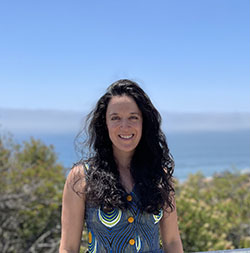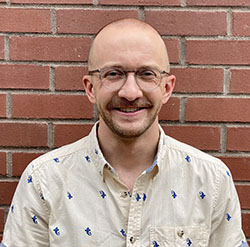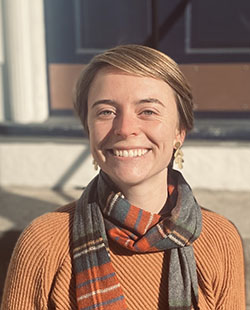Devon Newhouse, doctoral candidate in History
 Location: Lisbon, Portugal
Location: Lisbon, Portugal
Travel dates: October 2022 - May 2023
Newhouse will spend eight months doing research in the National Archive of Torre do Tombo (Portuguese archives), primarily in Lisbon. Her research traces how cashew made its way through the Portuguese empire to Goa, India. She will examine the cashew’s role in Goan food, alcohol and medicine. She will also look for evidence in the archives about how this tree integrated itself into Goan landscapes and ecosystems during the colonial period.
“I am looking forward to connecting with other scholars, exploring Goan and Portuguese culture in Lisbon, and eating lots of Portuguese pastries-- especially pastéis de nata,” says Newhouse.
Ike Uri, doctoral candidate in Sociology
 Location: Mumbai, India
Location: Mumbai, India
Travel dates: September 2022 - June 2023
Uri’s research focuses on how cities in India are preparing for quickly-intensifying effects of the climate crisis. In particular, how climate planning at the urban level is often 'outsourced' to consultants and nongovernmental experts.
In Mumbai, he is contributing to early implementation work on the city’s Climate Action Plan, which was recently completed by experts at a nongovernmental organization (NGO). He will examine the relationship between the NGO and the urban government, how concepts like climate vulnerability and resilience are framed, how nascent climate-focused planning relates to already-existing urban planning practices in India's largest city, and how politics impact these efforts. This project will help to shed light on how urban climate planning occurs on the ground and what barriers impede climate action in cities.
“I’m enjoying learning about climate action in Mumbai, and I’m looking forward to continuing to explore this incredible city and travel in India,” says Uri.
Sarah Christensen, doctoral candidate in History
 Location: Vienna, Austria
Location: Vienna, Austria
Travel dates: October 2022 - June 2023
Christensen will spend nine months living in Vienna and traveling to archives and historical sites around Europe. Her dissertation explores histories of slavery in early medieval Europe (ca. 400-1100 CE), with a focus on the intimate lives of enslaved women. She is interested in sharing a gendered lens to the everyday experiences of people who are trafficked across Europe for human labor.
Enslaved women don't often appear in textual sources, Christensen shares, so much of her time in Austria will be spent outside of traditional archives. She will visit ruined forts along the Roman Danubian frontier, where enslaved women lived and died, and trace the evidence for ports and toll stations that help track the geography of the slave trade.
In museums, she will review rare material evidence of medieval slavery, such as iron chains and collars, and the products of enslaved women's labor, including textiles and pottery. By looking at these material sources in addition to royal chronicles, religious texts, and other tales, she hopes to illuminate the intimate relationships that shaped enslaved women's experiences in this period.
With Fulbright's support, she will also pursue a public history project linking the stories of early medieval enslaved women with contemporary narratives of women trafficked through modern Austria, in order to highlight the deep history of an ongoing crisis.
“I'm excited to get to know a cohort of other doctoral scholars from all over the world, and to explore Vienna's wealth of historical and cultural offerings, especially classical music,” says Christensen.